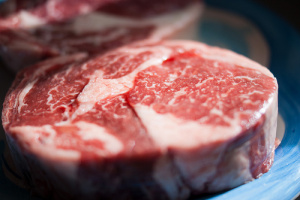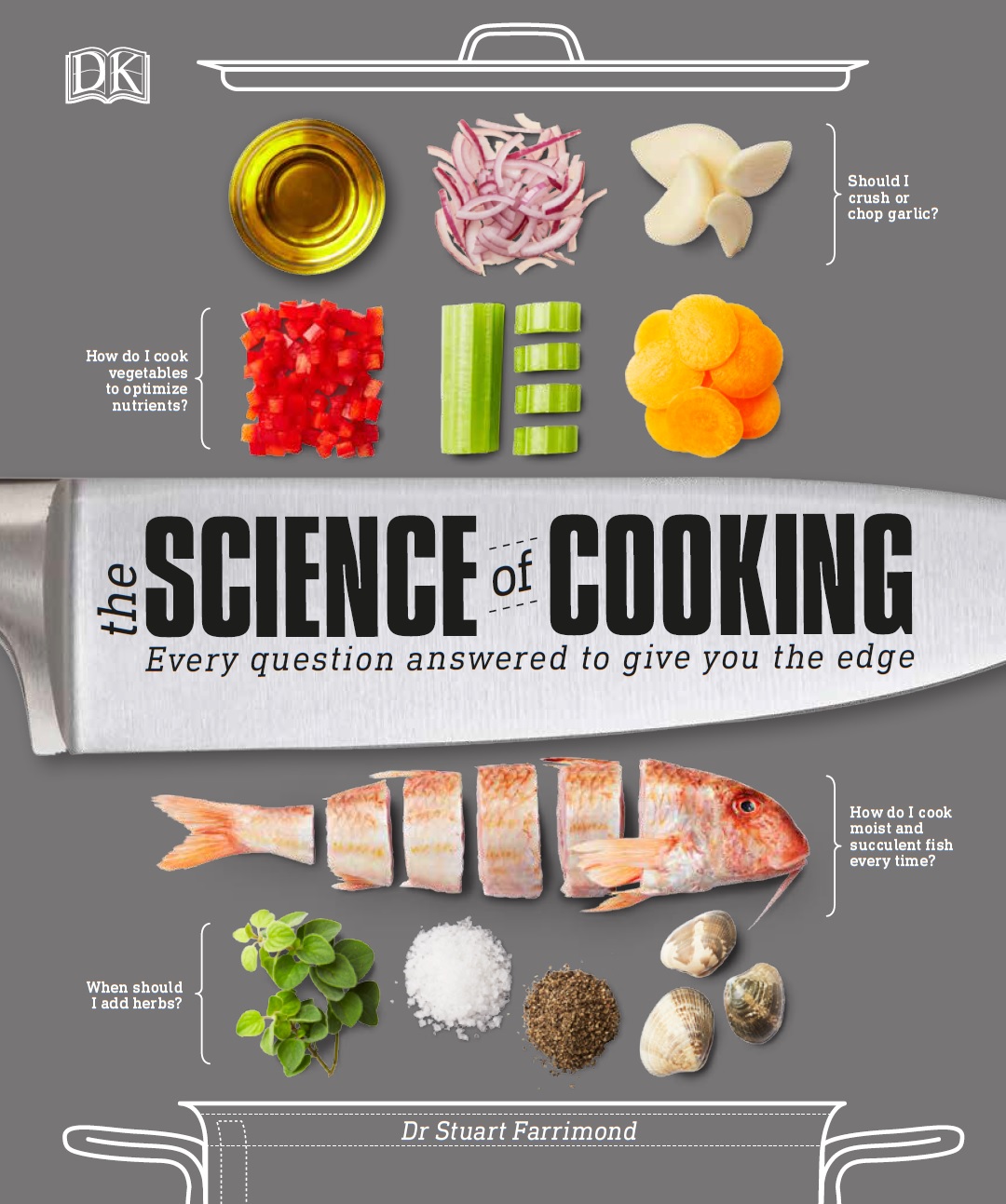 Vegetarians, look away now. Today’s post is distinctly carnivorous. Read on, you red meat eaters, as we are discussing an issue of upmost culinary importance…
Vegetarians, look away now. Today’s post is distinctly carnivorous. Read on, you red meat eaters, as we are discussing an issue of upmost culinary importance…
You can’t beat a good steak, I say. Quality medium-rare beef fillet; served with fries and salad is true feel-good food. I know I’m not the only one: it is one of the most popular last meals for death row inmates (after deep fried chicken). Not that that should necessarily be a measure of good taste.
Personal preferences aside (an overcooked sirloin is a travesty), is there a secret to grilling the tastiest, most nutritious steak? Whether or not you like yours with mustard, here’s some science to guide you in the kitchen…
How long should you cook your steak?
Recent years has seen the emergence of a popular ‘raw food’ movement. Dehydrating food to make it palatable, raw-foodies argue that cooking food destroys valuable vitamins and enzymes, rendering it nutritionally impoverished. It sounds logical, but – especially with vegetables – is often false. Many vegetables actually gain nutritional value after careful cooking or steaming. Furthermore, a strict vegan raw food diet is not good for long term health (references below).
Meat isn’t the sort of thing you normally eat raw (uncooked pork and shellfish are especially best avoided raw). Red meat is notable in that it contains a good source of B-vitamins that are essential for healthy muscles, skin and nerves. It also contains iron and other important minerals. Like most things however, steak should be in moderation as a high intake is associated with colon cancer and other health nasties.
So what happens to the good nutritional qualities of steak after a close encounter with a hot plate?
Swiss researchers Gerber, Scheeder and Wenk have largely resolved this rare vs. well-done health debate. Cooking 200g samples of a variety of meats, they measured the change in vitamin and mineral content in each. After cooking, all meats produced similar findings, but we’ll focus on the beef:
- The longer steak is cooked, the fewer vitamins it contains
- Cooking meat in water reduces its vitamin content further (the vitamins leech out into the water)
- The levels of iron and zinc increase with cooking
- Fat levels drop with cooking
The last point is well worth remembering if you are on a diet, or care about your arteries.
Cook steak from frozen or fresh?
 I’m a purist, and wouldn’t dream of cooking beef from frozen. I’m also a pragmatist, and high street butchers can be difficult to come by. It’s a particular issue for restaurants and food outlets who need to buy and store meat in bulk. Researchers from Kansas State University (a city famous for the steak house featured in Top Gun) investigated the problem. They methodically weighed and sliced Top Sirloin and Loin cut (to 2.54cm thickness with a band saw, no less), cooked, then tasted them from either frozen or thawed state.
I’m a purist, and wouldn’t dream of cooking beef from frozen. I’m also a pragmatist, and high street butchers can be difficult to come by. It’s a particular issue for restaurants and food outlets who need to buy and store meat in bulk. Researchers from Kansas State University (a city famous for the steak house featured in Top Gun) investigated the problem. They methodically weighed and sliced Top Sirloin and Loin cut (to 2.54cm thickness with a band saw, no less), cooked, then tasted them from either frozen or thawed state.
Six ‘trained panellists’ ate and rated the meat according to tenderness, juiciness, flavour and toughness. The shear force of each steak was also measured in a machine (crudely, a measure of how squidgy it is). All the results tabulated and statistically analysed. A lot of work, but all in a good cause…
Their findings, based on a medium-well done steaks (internal meat temperature 70°C) were that:
- Steaks cooked from frozen taste just as good
- Frozen steak looks significantly darker after cooking
- A frozen steak shrinks considerably more than a thawed one (losing 30% in bulk and 20% in size)
- Frozen steaks taste tougher – although incidentally they record the same on the ‘squidgy’ factor (Shear Force) readings.
So, if taste and time are your priority, there’s no harm in cooking a steak from frozen, it just tastes a bit tougher.
To conclude, if you want vitamins: go rare. If you want iron: go well done. Want tender meat? Don’t freeze it. On a diet? Cook it to smithereens. And if you want a long life, eat fish.
.
Thanks for reading - feel free to leave comments below…
REFERENCES:
Koebnick, C., Strassner, C., Hoffmann, I., & Leitzmann, C. (1999). Consequences of a Long-Term Raw Food Diet on Body Weight and Menstruation: Results of a Questionnaire Survey Annals of Nutrition and Metabolism, 43 (2), 69-79 DOI: 10.1159/000012770
Faller, A., & Fialho, E. (2009). The antioxidant capacity and polyphenol content of organic and conventional retail vegetables after domestic cooking Food Research International, 42 (1), 210-215 DOI: 10.1016/j.foodres.2008.10.009
Gerber N, Scheeder MR, & Wenk C (2009). The influence of cooking and fat trimming on the actual nutrient intake from meat. Meat science, 81 (1), 148-54 PMID: 22063975
Obuz E, & Dikeman ME (2003). Effects of cooking beef muscles from frozen or thawed states on cooking traits and palatability. Meat science, 65 (3), 993-7 PMID: 22063680










Try to eat beef that has been fed and finished on grass instead of grain, and you will get more Omega 3 fat. You can often tell as the fat is yellower.
Cooking sous vide keeps all the goodness in the bag
The bit of the steak that gives that lovely steaky flavour is the caramelised outer coating that comes from searing it… but that’s the bit that increases cancer risk
Posted by christo | April 30, 2012, 2:39 pmThanks for the comment!
The cooking tip would make sense, and prevent the leeching of vitamins and minerals. It would make sense that what cattle eat affects the nutritional value of the meat. Is there any evidence for higher Omega 3? I find that steak bought from our local farm shop far superior to the stuff you get in the supermarkets.
Charred and burnt food (even some very dark beers) do contain carcinogens. I’m never sure how significant this is though.
Posted by Stuart Farrimond | April 30, 2012, 8:51 pmSous vide takes quite a long time for meat, and it is difficult to avoid expensive equipment, but fish is quite fast, and you can do it in a saucepan with a thermometer. Very tasty.
We raise Dexter cattle, which taste awesome on grass. http://www.traditional-foods.com/data-bites/grass-fed-beef-omega-3/
Also see this: http://www.westonaprice.org/food-features/success-with-grass-fed-beef
Posted by Christo | April 30, 2012, 9:11 pmI don’t understand the statement that if you want more iron cook it longer. There is already a finite amount of iron in the steak. Cooking it longer will not change that.
Posted by jerry brooks | May 26, 2012, 4:29 amGood question.
Iron comes in different forms. In meat it is referred to as ‘heme’ iron, whereas in vegetables it is called ‘non-heme’ iron. The iron that comes from meat is more easily absorbed by the body. On a molecular level, heme iron makes up part of a protein (there’s a link to an image below). Reasons for why heme iron is better absorbed in the gut aren’t entirely clear.
The amount of iron absorbed is called is ‘bioavailability’. On a meat based diet, this is 15% - meaning that only 15% of the iron in the food actually makes it into the blood. (Vegetarians diets are approx. 8% and so need to have more iron in their diet).
The research discussed in this post showed that the cooking of steaks for these time periods increased the bioavailability of iron. Quite why, I’m not sure. Presumably the cooking process altered the shape of the heme molecule, making it easier for the iron to be digested and taken in by the body.
So yes – the amount of iron within a steak can’t possibly increase with cooking – but the amount that you get (its bioavailability) does.
Hope that helps!
Image of Haemaglobin: http://www.google.co.uk/imgres?q=heme+molecule&start=204&hl=en&tbm=isch&tbnid=GETA-gQvZ3i66M:&imgrefurl=http://www.easynotecards.com/print_cards/2967&docid=D4b2_6QvOOBktM&imgurl=http://www.easynotecards.com/uploads/1054/13/363cda1_1358f449591__8000_00000013.jpg&w=800&h=564&ei=9ILDT_HNNNGS0QXwg9nFCg&zoom=1&iact=hc&vpx=968&vpy=258&dur=1164&hovh=188&hovw=267&tx=186&ty=211&sig=113077690325325878250&page=9&tbnh=161&tbnw=263&ndsp=25&ved=1t:429,r:4,s:204,i:69&biw=1280&bih=900
Research paper on bioavailability of iron from different diets: http://www.ajcn.org/content/91/5/1461S.full
Posted by Stuart Farrimond | May 28, 2012, 2:59 pmI Only wanted to know how? what time is for a rare/ medium an dwell done instead I get all thsi nutrious stuff!
Posted by santha | August 15, 2012, 11:03 amThe well done steaks were cooked to an internal temperature of 72 degrees C in the study. You can use this guide for temperatures: http://whatscookingamerica.net/Information/MeatTemperatureChart.htm
Posted by Stuart Farrimond | December 18, 2015, 6:56 pmRare red meat is rich in glutatione, the little known king of all antioxidants in the body. Protein, with the other vitamins and minerals are all positives. I prefer medium rare and steak cooked more than medium I consider gray meat with no taste. Overcooked burnt meat definitely are carcinogens that cause cancer. Eating red meat has healthy qualities, I’m no doctor but have seen adverse affects of vegetarian lifestyle. Children born with serious birth defects because of the mother’s strict vegetarian diet. Also, The truth is starting to come out on the dangers of soy.
Posted by Eric from Massachusetts | September 8, 2012, 2:06 pmNever over cook beef. This “test” is invalid. Our gut looks at over cooked and raw meat much differently, the raw meat being more digestible.
Posted by RWT | December 18, 2015, 6:10 pmThis post reviews scientific research on the subject. It doesn’t say that well done steak is best. Read the last sentence for a summary.
In terms of whether raw meat is more digestible than cooked meat, it’s worth looking at this study that shows that the gut is better able to extract energy from cooked meat: http://www.pnas.org/content/108/48/19199.full?sid=e069d8e2-b63f-4a04-bb2f-412da5732d85
There are also an interesting selection of answers about raw vs cooked meat in terms of digestibility here: https://www.quora.com/Are-human-stomachs-better-able-to-digest-cooked-meat-than-raw-meat-If-yes-why-did-we-evolve-this-way
Posted by Stuart Farrimond | December 18, 2015, 7:03 pmNasty I would never eat raw meat😩
Posted by Jane | October 21, 2016, 10:21 pmIn my family, there is a big controversy as to how a steak should be cooked. The question is, how long should one cook a steak? I find it interesting that the longer meat is cooked the fewer vitamins it contains. Good to know, thanks.
Posted by Jade Brunet | June 23, 2016, 9:27 pmA pleasure, thanks for commenting
Posted by Stuart Farrimond | June 23, 2016, 9:49 pmMaybe it’s just being obese talking, but I like my steaks rare (red and not warm in the middle) with a barley-seared strip of fat along the side. It’s kinda chewy. It does taste incredibly good fully rendered and soft, I just like the texture of the lesser-done.
not saying any other steak (except well/welldone) is wrong or bad, just I know what I prefer and most people don’t seem to like the barely done fat.
Posted by mikemath3mike | June 26, 2017, 3:03 pm